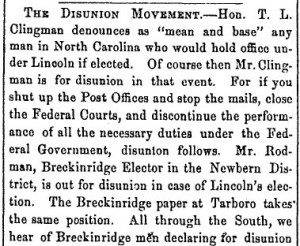 While some southern editors argued before election day in November 1860 that a Republican victory would justify secession, the Fayetteville (NC) Observer was prepared to accept Abraham Lincoln as President. The Observer, which supported Constitutional Union candidates John Bell and Edward Everett, believed that there was no choice but to accept the results of an election that they participated in. If “[it was] decided constitutionally,” the Observer explainedthat “we [were] honor bound to abide its results.” Southerners who threatened to secede only created more problems, particularly those who were not prepared to follow through with their threats. “We have had enough of ultimatum-manufacturing,” as the Observer noted. Those southerners had a bad “habit of invariably back out after” issuing ultimatums and, as the Observer argued, the repeated false alarms “[had] made the North believe that the South cannot be kicked out of the Union.” This scenario was dangerous since the Observer, like other unionist papers, did not completely reject secession as an option. If President Lincoln took any action that they considered a threat to slavery, many would support disunion. For the Observer and other ‘conditional’ unionists, the turning point was President Lincoln’s call for volunteers after Confederates attacked Fort Sumter in April 1861. One of the best sources on southern unionists’ perspectives during this period is Daniel W. Crofts’ Reluctant Confederates: Upper South Unionists in the Secession Crisis (1989). While Crofts discusses the Upper South, Edward Ayers focuses on southern unionists Augusta County, Virginia in In the Presence of Mine Enemies: War in the Heart of America, 1859-1863 (2003). You can learn more about that community online at the Valley of the Shadow project.
While some southern editors argued before election day in November 1860 that a Republican victory would justify secession, the Fayetteville (NC) Observer was prepared to accept Abraham Lincoln as President. The Observer, which supported Constitutional Union candidates John Bell and Edward Everett, believed that there was no choice but to accept the results of an election that they participated in. If “[it was] decided constitutionally,” the Observer explainedthat “we [were] honor bound to abide its results.” Southerners who threatened to secede only created more problems, particularly those who were not prepared to follow through with their threats. “We have had enough of ultimatum-manufacturing,” as the Observer noted. Those southerners had a bad “habit of invariably back out after” issuing ultimatums and, as the Observer argued, the repeated false alarms “[had] made the North believe that the South cannot be kicked out of the Union.” This scenario was dangerous since the Observer, like other unionist papers, did not completely reject secession as an option. If President Lincoln took any action that they considered a threat to slavery, many would support disunion. For the Observer and other ‘conditional’ unionists, the turning point was President Lincoln’s call for volunteers after Confederates attacked Fort Sumter in April 1861. One of the best sources on southern unionists’ perspectives during this period is Daniel W. Crofts’ Reluctant Confederates: Upper South Unionists in the Secession Crisis (1989). While Crofts discusses the Upper South, Edward Ayers focuses on southern unionists Augusta County, Virginia in In the Presence of Mine Enemies: War in the Heart of America, 1859-1863 (2003). You can learn more about that community online at the Valley of the Shadow project.
28
Jul
10








Related Articles
No user responded in this post
Leave A Reply
Please Note: Comment moderation maybe active so there is no need to resubmit your comments